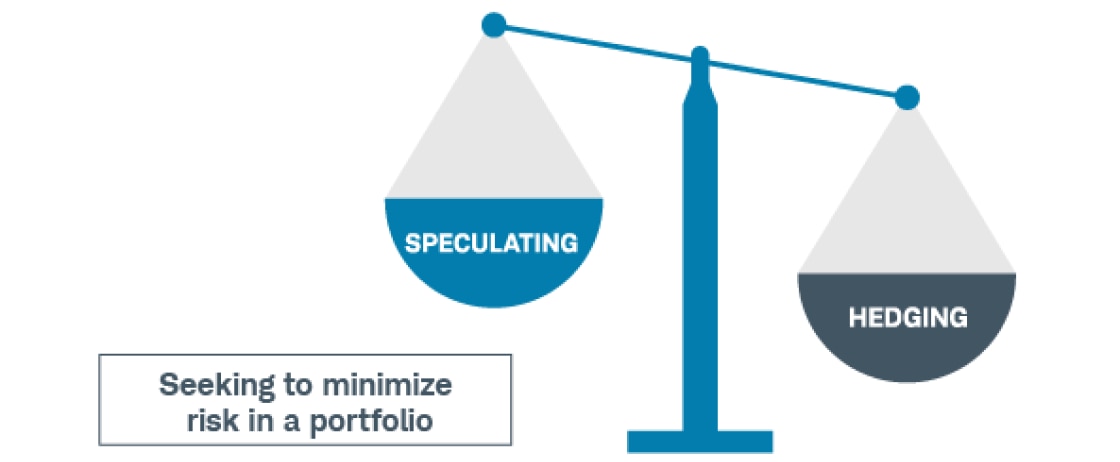Introduction to futures
Learn the basics of futures and considerations for trading them.
Futures and futures options trading is provided by Charles Schwab Futures and Forex LLC.
What are futures?
Futures are a type of derivative contract agreement to buy or sell a specific commodity asset or security at a set future date for a set price. Learn more about the key contract specifications in each futures contract.
To trade futures, you must have a futures trading account. You can open an account with Schwab, and qualified clients can apply for futures approval.

Why trade futures?
Around-the-clock trading opportunities
Most futures markets are open nearly 24 hours a day, five days a week, allowing you to react to global events, hedge, and speculate on a variety of indices, commodities, and currencies to help manage your portfolio outside of U.S. stock market hours.
Direct market exposure
When investing in stocks, you're investing in a particular company. However, when trading futures, you can gain direct market exposure to specific indices or commodities. This direct market exposure offers the potential for a more macroeconomic view.
Explore the wide variety of futures markets.
Capital efficiency
Establishing an equity position in a margin account requires you to pay 50% or more of its full value. With futures, the required initial margin amount is typically set between 3%–12% of the underlying contract value1. Learn more about futures margin.
Leverage offers you the potential to efficiently utilize your capital and generate larger returns as a percent of capital invested. But it can also magnify losses quicker and with smaller market movements, putting you at risk of losing more than your initial investment.
Learn more by reading "Using Futures for Capital Efficiency."
Potential tax benefits
Profitable futures trades are taxed on a 60/40 basis: 60% of gains are taxed at the long-term capital gains rate, and 40% of gains are taxed at the short-term capital gains rate like ordinary income.*
Learn more by reading "Capital Gains Explained."
*Schwab does not provide tax advice. Clients should consult a professional tax advisor for their specific tax advice needs.
Learn about the basics of trading futures and the role they can play in a portfolio with our educational course.
Schwab clients can log in to access our in-depth course Fundamentals of Futures Trading.
Key differences between futures and stocks
Understanding how futures differ from stocks can help you decide how each might fit into your strategy.
| | Futures | Stocks |
|---|---|---|
| Product choices | Access a wide variety of assets, such as stock indices, commodities, bonds, currencies, and volatility. | Partial ownership of a broad range of publicly traded companies within different market sectors. |
| Margin | Initial margin requirements are generally a fraction of the contract value; typically 3-12%. These percentage requirements can fluctuate.1 |
50% of the purchase amount (Regulation T). Please note: Not all stocks are marginable.
|
| Trading hours |
Most futures trade nearly 24 hours a day, 5 days a week. Please note: Different contracts trade at different times, and it's important to know those times before trading.
|
Outside of the regular U.S. exchange market hours of 9:30 a.m. to 4:00 p.m. ET, Schwab offers extended pre-market and after-hours trading sessions on all of our platforms. Additionally, extended+overnight (24/5) trading of over 1,100 equities is available on any thinkorswim® platform, including all stocks in the S&P 500, Nasdaq 100, and Dow 30, plus over 600 exchange-traded funds (ETFs). |
| Liquidity |
Tooltip
is measured by several measures: the bid/ask spread, daily contract trading volume, and open interest. Futures trading is volatile and liquidity varies across products, plus it can be impacted by economic and market conditions. |
Liquidity is typically strongest in large-capitalization equities, where trading activity is highest. Smaller or less frequently traded stocks may see lower levels of liquidity. |
Learn more about how futures differ from stocks.
Trading Futures vs. Stocks: What's the Difference?
Learn how futures and stocks are different and other important considerations for trading them.
How Tick Sizes and Values Vary in Index Futures
Discover the basics of futures tick sizes and why understanding them is fundamental for trading futures.
Stock options vs. futures options: How do they compare?
While there are some key similarities when it comes to stock options and futures options, there are key differences to know as well. This includes limitations to the types of orders you can place on futures options compared to stock options.
Explore futures options, how they differ from equity options, and considerations to pay attention to when trading them.

Uses for futures
Futures generally have two uses in trading: hedging and speculation.

Hedging with futures
One of the reasons futures markets exist is to help facilitate the management of portfolio risk. Thus, some traders may use them to hedge their equity portfolio. One way they might do this is by taking a futures position opposite to their positions in the actual commodity or financial instrument.
Learn about the uses and risks of speculating with futures in "Using Futures to Hedge Against Market Downturns."

Speculating with futures
Futures can be used to speculate on the market to attempt to profit from price swings in commodities, stock indices, and financial instruments. Speculators are the primary participants in the futures market, willingly taking risks that hedgers wish to transfer. Keep in mind speculating on futures can result in you losing more than your initial investment.
Learn about the uses and risks of speculating with futures: "How to Speculate with Futures."
Ready to trade futures?
Not yet a Schwab client?
Open a brokerage account online, then go to the Getting Started page for next steps.
Already a client?
Use your eligible brokerage account to apply for a futures trading account.